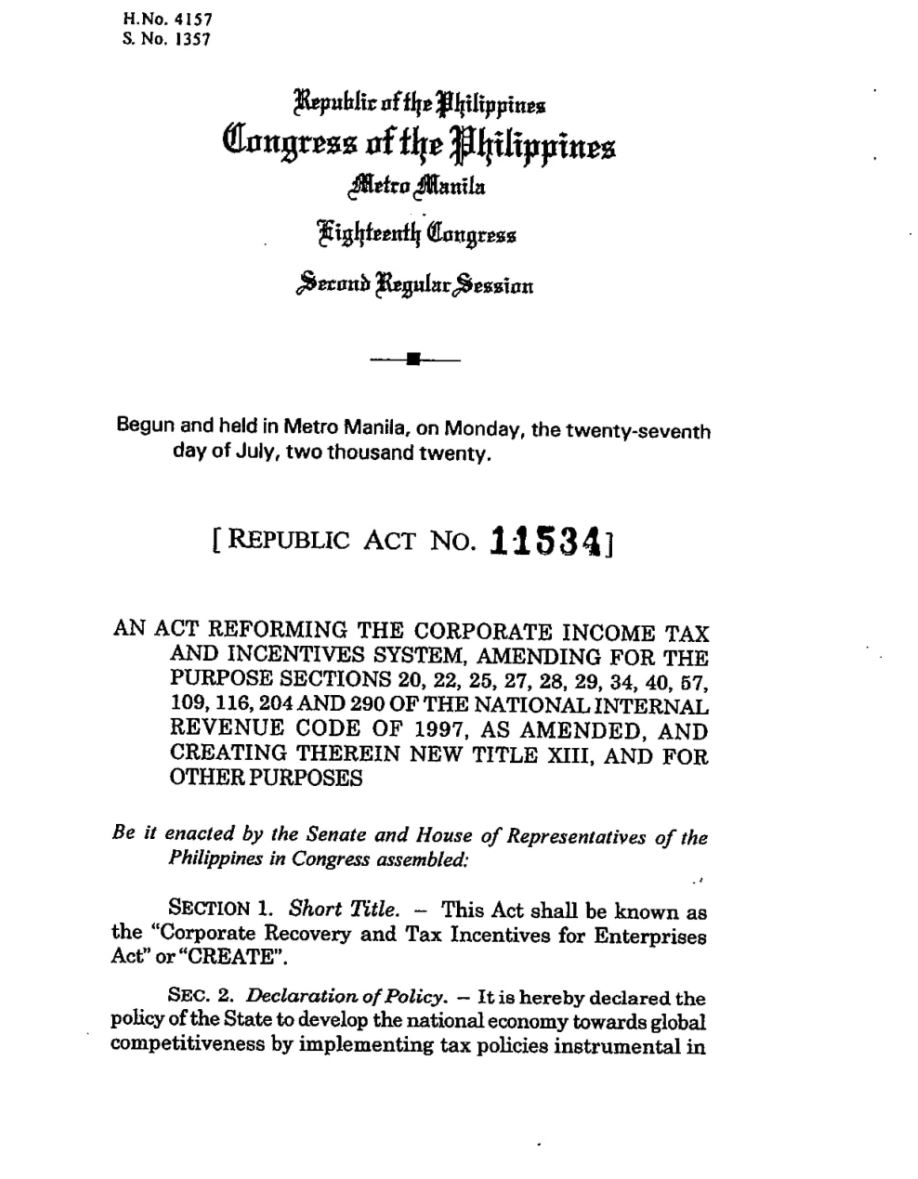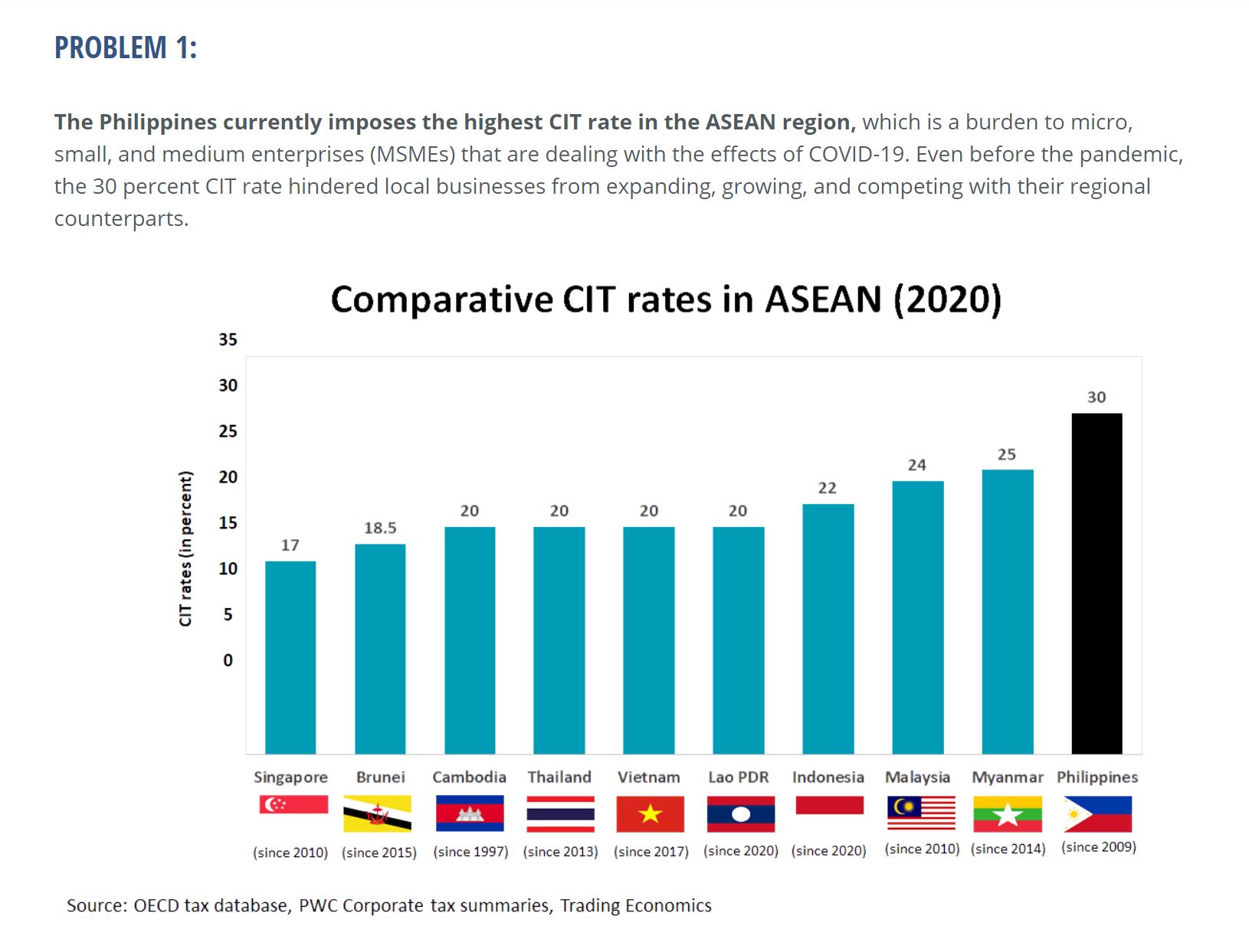
(Eagle News) — President Rodrigo Duterte signed into law on Friday, March 26, the proposed Corporate Recovery and Tax Incentives for Enterprises (CREATE) Act which lowered the corporate income tax rate to 25 percent in hopes of attracting more investments amid the still raging COVID-19 pandemic.
Republic Act (RA) 11534 or the CREATE Act introduces reforms to the corporate income tax and incentives systems.
Aside from cutting the corporate income tax rate to 25 percent from the current 30 percent, it also imposes a minimum corporate income tax of 2 percent of gross income on resident foreign corporations. For micro, small and medium enterprises, the CIT rate is 20 percent.
“An outright 5 percentage point reduction in the tax rate will benefit all business enterprises in the country that have not enjoyed any type of income tax incentive. The reduction will boost the efforts of enterprises, especially MSMEs, to protect jobs and recover from the challenges they have encountered due to COVID-19,” a Department of Finance briefer on the bill said.
-PHL had highest CIT rate among ASEAN nations before CREATE Act-
The 25 percent corporate income tax (CIT) rate to be implemented retroactive from July 1, 2020 would make the Philippines comparable with other ASEAN nations.
The Philippines before the CREATE Act “imposes the highest CIT rate in the ASEAN region, which is a burden to micro, small, and medium enterprises (MSMEs) that are dealing with the effects of COVID-19. Even before the pandemic, the 30 percent CIT rate hindered local businesses from expanding, growing, and competing with their regional counterparts,” according to the DOF.

The Senate in its earlier statement on the CREATE bill said that the “reduced CIT rate will allow businesses to recoup the unanticipated losses they incurred during the various stages of community quarantine across the nation.”
“The passage of CREATE will be particularly vital to micro, small, and medium enterprises (MSMEs), which make up 99 percent of the nation’s corporate taxpayers and employ a majority of Filipino workers,” it said.
Under the CREATE Act, foreign corporations will also be subject to an income tax equivalent to 25 percent of the taxable income derived in the preceding taxable year from all their sources within the Philippines.
The five percent cut in the CIT rate for domestic corporations will be done “provided, that corporations with net taxable income not exceeding PHP5 million and with total assets not exceeding PHP100 million, excluding land on which the particular business entity’s office, plan, and equipment are situated during the taxable year for which the tax is imposed, shall be taxed at 20 percent,” according to the law.
“The corporate income tax rate shall be applied on the amount computed by multiplying the number of months covered by the new rate within the fiscal year by the taxable income of the corporation for the period, divided by the twelve,” the law said.
-Regional headquarters of MNCs subject to 10 percent of taxable income-
For regional or area headquarters of multinational corporations (MNCs), they will either pay a tax of 10 percent or won’t pay taxes at all depending on their nature.
Regional or area headquarters of MNCs as defined in section 22 (EE) shall pay a tax of 10 percent of their taxable income, provided that effective Jan. 1, 2022, the regional headquarters shall be subject to the regular corporate income tax.
These refer to area headquarters of MNCs engaged in the following activities or services: general administration and planning; business planning and coordination; sourcing and procurement of raw materials and components; corporate finance advisory services; marketing control and sales promotion; training and personnel management; logistic services; research and development services and product development; technical support and maintenance; data processing and communication; and business development.
-Regional headquarters of MNCs exempt from income tax-
On the other hand, “regional or area headquarters as defined in Section 22 (DD) shall however now be subject to income tax,” the CREATE Act said.
These refer branches established in the Philippines by multinational companies and “which headquarters do not earn or derive income from the Philippines and which act as supervisory, communications and coordinating center for their affiliates, subsidiaries, or branches in the Asia-Pacific Region and other foreign markets.”
In a statement, Presidential Spokesperson Harry Roque said that President Duterte vetoed some items included in CREATE Law.
The President vetoed nine provisions of the CREATE Act, including the provision increasing value-added tax-exempt threshold on sale of real property, the 90-day period for processing of general tax refunds, and the provision that grants the country’s president to exempt any Investment Promotions Agency (IPA) from the new law, among others.
The CREATE acts also seeks to modernize the fiscal incentive system that will allow the government to offer superior incentives that are performance-based, strategically targeted, time-bound, and fully transparent.
(Eagle News Service)







